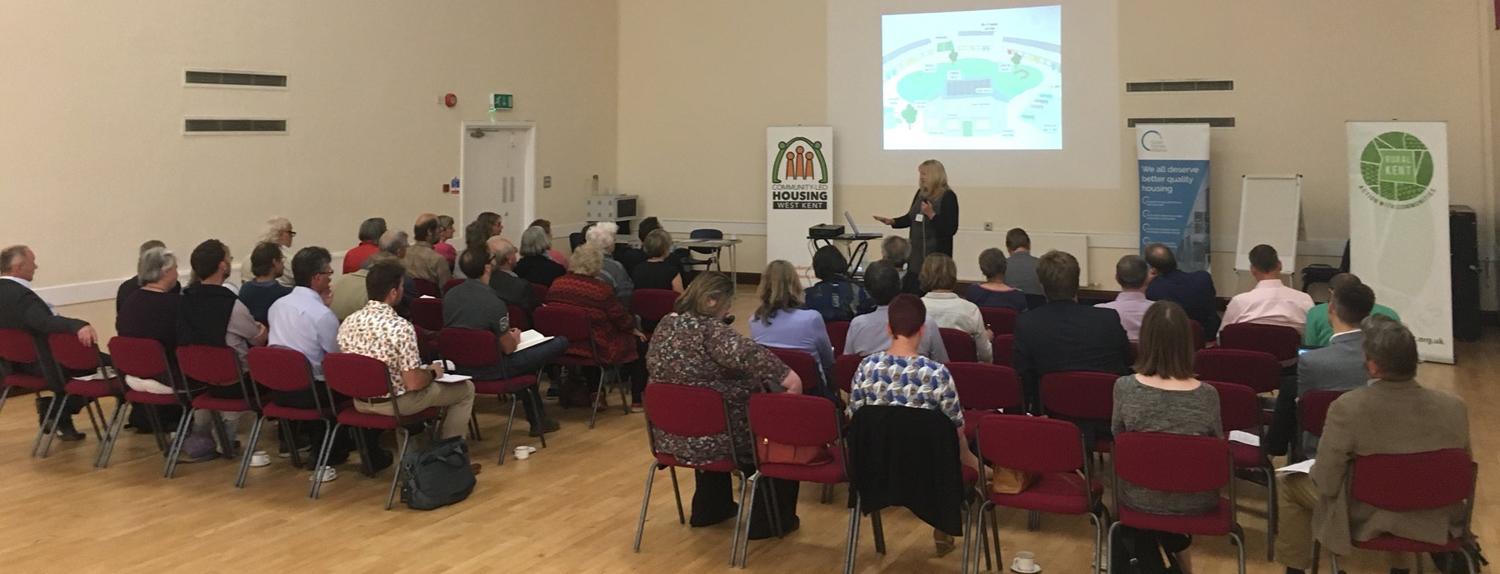Bringing together community-led housing projects, developers and enablers to create quality sustainable housing

We had a full house at our Alternative Housing Delivery Models event in Royal Tunbridge Wells, Kent on Wednesday 23rd May, with seven excellent presentations from our speakers. This is the second event GHA has held on this subject and we hope to hold more across the UK in the future.
We held the event as we believe that:
- Community-led housing projects have the potential to produce higher quality, more sustainable homes, communities and neighbourhoods.
- Our membership network contains high levels of non-traditional housebulding experience that produce high quality sustainable homes and we believe that a marriage between them and community housing groups could help projects deliver homes more quickly but without cutting corners on quality.
- There are opportunities for innovative partnerships between community housing groups, GHA members, landowners (both public and private), appropriate enabling organisations, funding organisations and the professional design and supply chain.
Event notes
The speakers selected a number of questions to ask to the audience for the discussion session at the end of the event. The questions and notes from the discussion are summarised below.
1. What help do communities need to move forward?
- The value of land needs to be driven down to enable community-led housing and affordable homes.
- Difficult for parish councils to be pro-active with such a complicated landscape to understand – need a community-led housing one stop shop.
- There is funding available via the Community Housing Fund (MHCLG/Homes England) which needs to spend £60 million on 2,000 homes per year. Charities Aid Foundation and Venturesome also offer financial support to community-led housing schemes
- The South Downs National Park, Policy SD28: Affordable Homes promotes community land trusts.
- Need further guidance regarding Registered Providers as Housing and Regeneration Act requires community-led housing schemes to consider becoming Registered Providers, which adds further costs.
- Pre-development finance can be sought from “Locality”.
- A need for more support from local plan policies, e.g, East Cambridgeshire District Council. (see below)
East Cambridgeshire District Council supports community-led development and has a special planning policy (Growth 5) that encourages this.
The planning policy lets communities bring forward sites in areas close to village or town boundaries which might be outside the normal development envelope. The community decides itself what is appropriate. These sites could include affordable housing, workspaces, community buildings and other amenities. And the project could also include some ‘market housing’ for sale to help pay for the community development if it would otherwise not go ahead.
The Council also provides support to anyone thinking of setting up a Community Land Trust with a grant to get started, a loan to provide pre-development finance and a CLT adviser to give advice, guidance and specialist help. Visit www.eastcambs.gov.uk for more information.
2. What are the options for minimising capital grant requirements e.g. by cross subsidy from on site market sales?
- Section 106 contributions plus cross subsidy from private sales.
3. Who’s afraid of the rules around “best consideration”/”best value” in disposing of public land?
- To reduce land values, community-led housing schemes can argue that they provide added social value.
- Neighbourhood Plans – consider allocation of land for community-led housing schemes as opposed to supportive policies which can raise hope value.
- Cambridge City Council disposed of land for a community housing scheme that made it irrelevant to large scale developers and kept the land price below market.
- For more information, read “How to make the case for community-led housing on public land”
4. Would you consider engaging with landowners around community-led housing schemes? Could enabling organisations help to broker these conversations?
- Selling the benefits of community-led housing schemes to landowners (who like to have legacies) may assist with land values.
5. Would it help to know what public land is available in your area/parish?
- Yes! A report by the CCIN Commission entitled “Community-Led Housing: a Key Role for Local Authorities” aims to promote good practice and innovation to enable councils to work with communities to generate more affordable housing and make best use of government funding for community-led housing.
6. Would model policies for community-led housing schemes be helpful for use in Neighbourhood Plans?
- Yes!
Event presentations
- Keith Harrison – Chief Executive, Action with Communities in Rural Kent
- Nigel Kersey – Team Leader, Ministry of Housing, Communities & Local Government
- Tom Warder – Community Led Housing Manager, Sussex Community Housing Hub
- Angela Vincent – Group Member Director (Kent Cohousing), UK Cohousing Network
- Sue Riddlestone OBE – Chief Executive and Co-Founder, Bioregional
- Sally Marsh – Co-Director, High Weald AONB Partnership
- Jo Lavis – Lincolnshire CLT and Vice Chair of the National CLT Network
- Jonny Anstead – Founding Director, TOWN
